Peter MALONE
Saturday, 09 October 2021 13:02
Four Kids and It
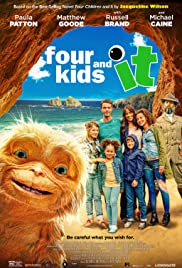
FOUR KIDS AND IT
UK, 2020, 110 minutes, Colour.
Teddie- Rose Malleson, Ashley Aufderheide, Matthew Goode, Paula Patton, Billy Jenkins, Ellie- Mae Siame, Russell Brand, voice of Michael Caine.
Directed by Andy de Emmonny.
Definitely a film for a younger audience. A question is how well will older children identify with the two girls at the centre of the story, Ros (Teddie - Rose Malleson and, British) and Samantha, known as Smash (Ashley Aufderheide, American). Smash comes across often as the wilful and spoilt brat. Ros can be disagreeable in a quietly British way. However, we know that by the end of the film they are going to be friends. The little brother and sister, Robbie, British, and Maudie, American, are much more agreeable.
Actually, the title will remind readers of children’s books and those who saw the 2005 film, Five Children and It, based on the E.Nesbitt story, will soon find that this is, quite simply, a variation on the original book. Four children this time, two parents, and the It, a rather playful small creature, who lives in the sand, swimming, burrowing, collecting all kinds of offerings and storing them in the sand, Psammead – and, for parents watching and listening, quite a surprise that, when Psammead speaks, it sounds like Michael Caine with all his voice and intonations. And it is.
The background of the film is that the British father, David, played by Matthew Goode, is looking after his children because his wife has left them to go to find herself in university life. For the American mother, Alice, Paula Patton, her husband has left her and has taken up life in the Seychelles. When both families arrive at the same destination, for a holiday in Cornwall, the two girls discover to their dismay that the parents have been seeing each other and that this is an experiment to see how well they get on.
The two girls don’t. However, down on the beach, Psammead makes itself known, stealing things, pulling them under the sand. However, he is a pleasant creature and his gift is to grant one wish per day, ending at sunset. Which means then for the delight of the children’s audience, there are the stories of the wishes, Robbie wishing he could climb a cliff and enjoying himself clambering over the rocks and the heights. Smash wishes she could be a rock star, the other children getting a helicopter ride to London, seeing her perform, the adulation of the crowd, and everything evaporating at sunset and the difficulty of getting back home. Maudie would like to fly and the children have a kind of Peter Pan experience. Ros, on the other hand, would like to go back into the past, so there is excursion to 1920.
Naturally, there has to be a villain. This time it is an eccentric in a local Manor, played by Russell Brand, in a very Russell Brand in-your-face kind of way. Ultimately, he has wishes as well – and, as we might expect, while he gets his wishes, they also end at sunset!
The children wish things could go back to what they were and that is the temptation of a wish. But, this is the kind of story that needs a happy ending – and the final wish is a generous one and all’s well that ends well.
(Jacqueline Wilson, the author of this book, has a cameo experience during the credits where she is amongst those lined up to get her book, written by Ros, to be signed by the author.)
Not sure whether the adult audiences will like this film is much as the children will.
1. A film for children? Young children? The debt to 5 Children and It – a variation on the theme
2. British production and cast? Americans? For the wider audience?
3. The premise of Five Children and It, the children themselves, getting on with each other and not, parents, the discovery of the creature, the wishes and their fulfilment?
4. The introduction to Ros, Robbie, their ages, Ros and her love of books, dreaming of writing, always with a book? The librarian and Five Children and It? Robbie and his phone, computer games? The relationship with their father? His niceness? Their mother and her leaving them, going to find herself at the University?
5. The introduction to Samantha, her name of Smash, her age, with the boys in the street, Maudie as little sister, antipathy towards their mother? The father leaving them? And the Seychelles? Her wanting to go there?
6. The organisation of the holiday, driving to Cornwall, Ros and the family, the music, their father, Robbie and his games, sick? Alice, the girls, the hostility?
7. The arrival, the parcels, the reaction of the two girls, the lack of preparation for meeting? The rooms, Ros and Smash fighting, taunts?
8. The family going on the picnic, the attempted reconciliation, going down to the beach, the tunnel, Maudie and the doll disappearing, disturbance in the sand, the emergence of Psammead? His look, voice? Michael Caine? His swimming around the sand, appearing and disappearing? Explanation? The wishes?
9. Smash taunting Robbie, the phone on the cliff? His wish that he be a climber? Seeing him clambering over the rocks? The wishes ending at sunset? His being stranded? Ros and the rope and the sign, the rescue?
10. Early the next day, Smash going for her wish, the others caught up in it, her wanting to be a rock star? The helicopter ride and its excitement? The celebrity, the costumes, the crowds, admiration, the audience, performance, the others watching? Sunset and the end of the wish? Trying to get back, the phone call, the train, in the toilet compartment, their being taken back to their parents?
11. Audience response to some of the spoilt brat behaviour of the children? And the parenting?
12. Tristan Trent, eccentric, meeting him on the path, manner, way of speaking, insulting the Americans? Inviting them to visit the house? Showing the ground, the picture resembling Ros? The eccentric collection?
13. Alice, her attempts at cooking and failing? The two parents and their love for each other? And the phone calls from the former respective spouses? And their doing their own thing? Not wanting their children?
14. The wish to fly, the children in the air, Ros hanging onto the tree, disappearing? The exhilaration?
15. The wish, to go back into the past, seeing the children and their clothes, seeing Trent’s ancestor, his pursuit of them? Coming back to the present?
16. Psammead, his look, manner, talking, the wishes, inflating? At home in the sand? Talking about his history, dinosaurs?
17. Trent, his binoculars, wanting the Psammead, the machine goughing the sand, getting stuck? Eventually imprisoning it?
18. The children visiting, Psammead imprisoned, the electric shock? Trent and the fulfilment of his wish, the lavish lifestyle, the house, the furnishings, the women? His final wish,
for all the gold, the coin coming down the steps, the further coins, his being overwhelmed, the coins coming out of the windows and chimneys, the collapse of the house? The end
of the day, his lying bereft, the complete collapse?
19. Ros, formulating the wish, that things could go back to what was in the past, their separating? The drama, the tension, the wish for the Psammead itself, to be free for 100 years, the exhilaration in the sand?
20. And, friendships are made, happy ever after?
Published in Movie Reviews
Published in
Movie Reviews
Saturday, 09 October 2021 13:02
Return of Dracula, The
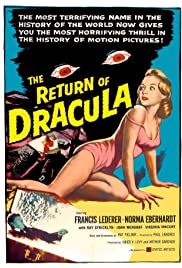
THE RETURN OF DRACULA
US, 1958, 77 minutes, Black-and-white/Colour.
Francis Lederer, Norma Eberhardt, Ray Stricklyn, John Wengraf, Virginia Vincent, Gage Clarke, Rita Granstedt.
Directed by Paul Landres.
1958 saw the emergence of Britain’s Hammer Studios and the production of a series of horror films, especially focusing on Frankenstein and Dracula.
Meanwhile, in the United States, this small film with an update of Dracula’s survival in Europe, his decision to move to the United States, to set up his coven there, was overshadowed. However, it plays quite well and has something of a cult reputation.
Czech actor, Francis Lederer, who came to the United States in the 1930s, looks the part of an ageing Dracula – wearing a suit and hat, a cloak, contemporary yet old world. He murders an artist during a train ride and assumes his identity, coming to live in a small Californian town with the artist’s family who accept him. He is sinister and singular but accepted.
We see him pursue a blind girl and transform her, later turning her into a wolf to attack an investigator. He also has his eye on the young daughter in the house, Rachel played by Norma Eberhardt. Rachel is being wooed by Tim, the young man next door.
The tone of the film is set by the opening where the vampire hunter and a group of people approaching a mausoleum to put a stake through Dracula’s heart – but he is gone. The vampire hunter then comes to the United States, gets the help of the local police, of the local Reverend, putting a stake through the heart of the blind girl (with the famous brief colour shot of red blood – which is present in the You-tube version). However, Dracula hypnotising Rachel, takes her to an abandoned mine where he has a coffin to rest in, but in the struggle with Tim, he falls into a pit and is impaled.
In a way, something of a relief from the traditional Dracula film.
1. The literary tradition of Dracula stories? History? The cinema history? By the late 1950s? Hammer Studios and subsequent series? Other versions?
2. This version as an updating of the Dracula story? Presupposing audience knowledge? The count? The living dead? Day in the coffin? Roaming at night? Drinking blood? Seeking women? Hypnotic powers? Vindictive?
3. The opening, the vampire hunter, the police, the monk? Going to the mausoleum? Opening the coffin? Dracula gone?
4. The artist, leaving his family, the American connections and hopes? On the train? Dracula reading the newspaper? The attack? Killing the artist? His papers and identity?
5. Dracula in the US, the train trip, Carleton California? The family eager to welcome him? The past contacts, letters, the art? Cora and her welcome, Rachel and Michael, Tim as the boy next door in love with Rachel? His sinister waiting at the station, travelling home with them?
6. The typical American family, the apple pie family! Cora and her running of the household, the doctor, pastor of the parish, the visit and his meal? Kindness? Rachel, her age, dress designing? Mickey, Young and mischievous? Tim always in the house?
7. Dracula as cousin Bellac, his room, removing the mirror, talk with Rachel, her being mesmerised?
8. The opening, the incident with the cat, the mine, the accident? Dracula returning to the mine, his coffin? Sleeping there?
9. His clothes, his look, not sociable? The family making allowances? Invitations? To the party?
10. The blind girl, Dracula and his pursuit, the drama of his killing her, in the mausoleum? Raising her? His enmity towards the investigator? Transformation to the wolf, killing the investigator?
11. The vampire hunter and the investigator, their visiting the town? Interviews with police? The help of the Reverend Doctor? The police and the interrogation of Dracula, his papers, ensuring all the questions?
12. The visit to the mausoleum, the dead girl, the stake through her heart – and the spurt of blood in colour and audience response?
13. Dracula, his hypnotising Rachel, wanting her to move the cross?
14. The party, the dress competition, Tim and his behaviour, Rachel and her reactions, going back to Dracula, the hypnosis? Tim and the attempts to rescue her?
15. Going to the abandoned mine, Dracula’s hold over Rachel, Tim and his struggle – and Dracula falling into the pit and impaled, dissolving to skeleton form?
16. The film overshadowed the time by Hammer Studios? Its reputation in retrospect?
Published in Movie Reviews
Published in
Movie Reviews
Saturday, 09 October 2021 13:02
Man of Conflict
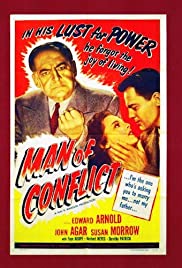
MAN OF CONFLICT
US, 1953, 72 minutes, Black-and-white.
Edward Arnold, John Agar, Susan Morrow, Fay Roope, Dorothy Patrick.
Directed by Hal R.Makelim.
Edward Arnold made a career out of portraying strong bosses, a big man, forceful, often bullying. Think It’s a Wonderful Life.
This is a strong role almost at the end of his career. He plays a self-made industrialist, admitting no errors, taking no prisoners, ruthless in his demands and expectations. His son, played by John Agar, his returning home and the plan is for him to take over the business. The son wants to spend time on the floor, working on the lathe, anonymously, gaining experience.
The girlfriend returns from Europe, loudly talking about his work with the workers then discovering who he was, hostility towards him because of his father. On the road, he is bashed by some thugs. His father is ruthless in trying to find out who the thugs were, sacking 10 workers a day, firing the man who helped his son and organising his daughter to be fired from the bank.
This is the 1950s, with echoes of red agitators, industrial relations. While Edward Arnold is powerful on screen, this is a good performance by John Agar, especially in a scene at the end with his father where we do not hear the father but see only the son’s facial response.
Interesting to compare industrial relations in those years with current situations and disputes.
1. A story of business and industry? In the 1950s? Issues of unions? Issues of big bosses and autocracy? Intimations of Leftist and Communist agitation?
2. The industry town, mansions, socials, the contrast with the similar houses in the streets, the workplaces? The musical score?
3. Edward Arnold as Compton, his expertise at this kind of role? Self-made, working on the floor, building himself up, his marriage and the portrait of his wife, ambitions for his son? Welcoming him back? The orders to change the sign, the sacking of the official? As a person, personality, absolutely right, not admitting any mistakes, peremptory with people, sackings?
4. Ray, returned from college, his upbringing, memories of his mother? Inheriting the company? His relationship with his father? His decision to go on the floor, the months passing, the year, his working with Jenks, anonymous? Jenks and his hostility, change, their working together? A sense of achievement?
5. Betty, her return, his identity, the past relationship, the plans? His reaction to her snobbery? Her returning, her looking down on the working class? His rejecting her?
6. Ray with Jenks, not putting on the glasses, the accident? Going to the hospital? His father’s severe reaction, sacking Jenks, bringing the bank manager, firing Jane? Ray and his visit to Jenks and his family, wanting to apologise, hearing the phone call with Jane fired?
7. Ray, confrontation with his father, organising the union meeting? Getting some support? His appeal to his father, Jenks and Jane being rehired? His father wanting the identity of the thugs? Sacking 10 people a day? Going back on this decision?
8. The buildup to the confrontation between father and son, Ray ready to walk away, his concern about people, security, ambition? His father’s comments about weakness and his mother?
9. Compton, going to the floor, back at the lathe, making something? His phone call to Jenks and to Ray?
10. The meeting, everybody at the table, Compton and his mellowing, the gift to Jane of the necklace, the gift to Ray of what he had made at the lathe?
11. A film of the 1950s? Industrial relations? How relevant to later decades?
Published in Movie Reviews
Published in
Movie Reviews
Saturday, 09 October 2021 13:02
Cocaine Godmother
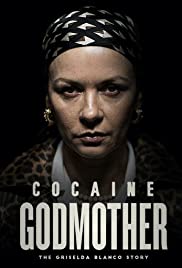
COCAINE GODMOTHER
US, 2017, 90 minutes, Colour.
Catherine Zeta-Jones?, Jenny Pellicer, Aleandro Edda, Warren Christie, Juan Pablo Espinosa,José Julian, Raul Mendez.
Directed by Guillermo Navarro.
There have been many films and television series as well as documentaries on the cocaine development and export, smuggling from Colombia at the end of the 20th century, the era of Pablo Escobar.
This is the true story of Griselda Blanco, her life in Colombia, hardships as a little girl and her shooting a drug and sex client and taking the money, to her migration to the United States, with an ineffectual husband, and three sons. She decides to move out of her humdrum life, dresses up, makes contact with the dealer, masterminds ways of smuggling, drugs concealed in bras, underwear, shoes, the development of false bottom suitcases – and she prospers. Eventually, her sons also go into business with her.
She is ruthless, developing drive-by shootings, initiating her new security chief by commanding him to murder the father of her son’s girlfriend who had insulted her. While she marries the guard a Pablo Escobar orders to watch her, she is infatuated with the young dancer, Carolina, the relationship lasting many years – tempting Carolina to drugs, leading to addiction into her death.
She has another boy with her new husband, and pampers him (even in a bizarre first communion sequence where she speaks piously) but then orders his death after he speaks to the DEA officer.
Ultimately, she is interviewed by the DEA, goes to prison, eventually gets out, wealthy, returning to Colombia, but killed in a drive-by assassination.
It is unexpected see Catherine Zeta-Jones? in this role – and there was some criticism at the time that it should have been played by a Hispanic actress.
The plot is interesting – but it is in many ways a sketchy portrait of Griselda Blanco.
1. The title and expectations? Based on a true story? Colombia in the 1950s to the 1970s? The cocaine trade? The transition to the United States? The background of Pablo Escobar?
2. The Columbia settings, the city of Medellin, homes, drugs? The transition to the US, the 1970s? There American cities, Miami, Los Angeles? The musical score?
3. Griselda, the prologue, the little girl, her slatternly mother, the men, the money and the drugs, her mother slapping her? Her getting the gun, confronting the man, his taunting her to shoot, her shooting, taking the money?
4. In the United States, with the three boys, drab life, her husband and drugs, his hitting her, her ousting him? The drug dealer? Her decision to glamorise herself?
5. The screenplay and the passing of years so quickly? Her transformation? The boys and their education, the son at college, the other two not wanting to go to school, joining in the trade?
6. Her innovations, body and clothes and shoes concealment of drugs? The elderly? The false bottom suitcase? And her use of drive-by shootings?
7. The attraction to Carolina, Carolina as a dancer, succumbing to Griselda? Companion, sexual relationship? Griselda persuading her to try cocaine? Her becoming an addict? Her being upset at Griselda’s marriage, the birth of Michael, her seeming to be relegated? Her death and Griselda’s grief?
8. The audition for the security guard? His being told to kill her son’s girlfriend’s father? Offscreen? Her son’s reaction? His disillusionment? Joining the drug dealing?
9. Grizelda and her success, her drugtaking, addiction? The shift to various cities, setting up in Miami? Her clothes, her wigs and different hairstyles? The visit of Escobar, deals with him? His delegate, promising to keep an eye on Griselda? The marriage? The wedding celebration, Griselda dancing with Carolina?
10. Months passing, the birth of Michael, Griselda in the bed, photos, the absolute devotion to her son? The scene of his first Communion? Her religious talk?
11. Years passing, the son growing up, the trade increasing, her own addiction? Her ruthlessness? Her security guard and his complete loyalty?
12. The husband, his visit to Columbia, the meeting with Escobar?
13. Jimmy, the DEA, the years of pursuit? Eventually meeting Griselda? His talking with her husband? Doing the deal? The husband taking his son, in Colombia, happy together? His driving along the road, anticipating his death, getting his son to sit in the car and close his eyes and ears? His death? The boy returned to his mother?
14. The further complications, Griselda and her ruthlessness, even to killing children and those indebted to her? Her sons, the young friends, her shooting people in the toilet area?
Her decline?
15. The discussion with Jimmy, fencing and flirting, her accepting going to jail, the years passing, her release, finance? Her being killed by the drive-by killer?
16. How successful a contribution to the films and television series about cocaine dealing in Colombia and Pablo Escobar?
Published in Movie Reviews
Published in
Movie Reviews
Saturday, 09 October 2021 13:02
Without Warning: the James Brady Story
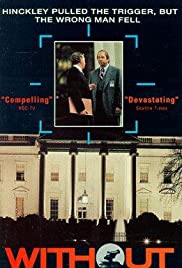
WITHOUT WARNING: THE JAMES BRADY STORY
US, 1991, 88 minutes, Colour.
Beau Bridges, Joan Allen, David Strathairn, Bryan Clark, Steven Flynn, Gary Grubbs, Susan Brown.
Directed by Michael Toshiyuki Uno.
James Brady was press secretary for Richard Nixon, about to become the leader of the press office when Nixon was elected. When John Hinckley attempted to assassinate Richard Nixon, others were shot in his attempt, including James Brady who had injuries to his head, below his brain. He was rushed to hospital, not expected to live, but major recovery, spending over a year in rehabilitation and recuperation.
Beau Bridges portrays Brady and won several awards for his performance. Joan Allen is strong as his wife, having to support him, at the end sometimes of his moods, especially when she was invited to participate with the anti-gun lobby. (The end of the film is, in fact, actual footage of Jim and Sarah Brady at a hearing on anti--gun legislation in 1991.) David Strathairn is his very sympathetic and patient doctor.
The film initially paints a portrait of a very jovial Brady, getting on well with the press gallery, married to Sarah and with a young son who does not understand what has happened when his father is shot, confined to bed, has seizures. Symbolically, the final sequence is the building of a kite, Sarah trying to keep it in the air but failing, the young boy working on it and the family then united in the flying of the kite.
Bryan Clark gives a sympathetic performance of President Reagan, especially visiting Brady in hospital with Nancy Reagan, honouring Brady – but Brady having to realise and accept that his memory is patchy and that he is not up to the task of Press Secretary even though his office was kept for him.
Interestingly, this was the last screenplay written by Robert Bolt (A Man for Seasons, Ryan’s Daughter, Lady Caroline Lamb, A Passage to India). Bolt himself had a severe stroke in real life and was cared for by his actress wife, Sarah Miles – an empathy for Jim Brady’s situation.
1. The significance of the film in its time? Gun legislation, the 1980s, the 1990s?
2. The screenplay written by Robert Bolt? His career? His own personal health history?
3. Audience knowledge of James Brady, at the time, subsequently? His role in the Reagan Administration? Press Secretary? Admired by Reagan, by his team, by journalists?
4. The assassination attempt on President Reagan? His being injured? The other members of the team being shot? James Brady and his head injuries?
5. The glimpse of John Hinckley, intense, his age, buying the revolver, the advice of the salesman, his obsession with Jodie Foster, writing to her, trying to visit her, her refusal? His motivation?
6. The brief attention of the film to Hinckley, the crowd, in the crowd, pulling the gun, the shooting, his being apprehended? Interrogated by the police? Admiring Reagan, being Republican, his motivation being personal? Sarah Brady watching the rerun on television?
7. Ronald Reagan, his background, election as President, the landslide? His personality, press conferences, working with Brady, Brady correcting him, reminding him? His being injured, recovery? His visiting Brady in hospital? Support? The office, Brady cutting the ribbon? The other members of the press team, Larry Speakes as associate, fronting the media? Supporting Brady in the aftermath of the shooting?
8. Brady in action, handling the correspondence, his quips, popularity?
9. Brady, his relationship with Sarah, her support? Their son? His age? Reagan’s selection, the group waiting for the phone call, Brady serious, then the excitement of his appointment? His nickname, the Bear? The images of Bear throughout? The sounds of the bear?
10. The shooting, the injuries to Brady? Sarah doing the cleaning, the television report, his death, the change of information? Going to the hospital?
11. The long months of treatment, surgery, rehabilitation? Dr Kobrine, his work, thoroughness, interactions with Sarah, information, her keeping the piece of bullet? The continued supervision, friendship?
12. Brady, possibility of his dying, possibility of brain damage? His gradual communication, finger movements, words, his head and binding, freer, in bed, the recuperation, the physiotherapy? His range of moods? Treatment of friends?
13. Sarah, her continued support, love for Brady, the sexual encounter? His domination, that he was the boss in the household? His severity towards her, the approach by the anti-gun lobby, his tantrum and hitting her? His later apology? The discussion about his job, his not being able to remember the names of correspondence, finally admitting that he could not do the job?
14. The visit from the doctor, his continued friendship, Brady and his defiance?
15. The sequence of the kite, the son and his age, upset about his father, seeing him have the seizure and not liking it? On the beach, Sarah and her awkwardness, flying the kite, its crash? Trying to mend it? The son and his eventually fixing it? Flying?
16. And the transition to the hearings about gun control, his speech, Sarah speech, his support of her?
17. A film about disaster without warning, the consequences, the challenge of recuperation and rehabilitation?
Published in Movie Reviews
Published in
Movie Reviews
Saturday, 09 October 2021 13:02
Les Miserables/ 2019
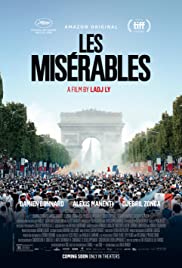
LES MISERABLES
France, 2019, 104 minutes, Colour.
Damien Bonnard, Alexis Manenti, Djebril Zonga, Issa Perica, Al Hallsan Ly Almamy Kanoute.
Directed by Ladj Ly.
Over the decades there have been so many film and television versions of Victor Hugo’s Les Miserables. This is not another version but, rather, a homage to Hugo, his storytelling, his observation of the struggles of the poor in Paris, movements of revolution. It has been co-written and directed by Mali-born, Ladj Ly.
The film is set in the ethnic-mix area of Paris where Hugo wrote is masterwork.
The story focuses especially on children and teenagers in the area, glimpses of their home life and their parents, an introduction to mentors, some of whom agitate, others of whom want the best for the youngsters in the Muslim tradition. There are many scenes of the children outside, at games, congregating, fearful and suspicious of police, chasing the police – and an ultimate scene of many-revolution in a high-rise building, on the steps, in the lift.
However, the audience is introduced to this atmosphere via a policeman, Stephane (Damien Bonnard) transferring from the country to the city to be near his son, whose ex-wife has custody. He is put in a team with two veterans who have been patrolling the area for years, known by the young people, links with the mentors, and not particularly well liked. The officer in charge, Chris (Alexis Manenti) an anti-who co-wrote the script with the Dir) is brusque, not particularly race tolerant, has absorbed an authoritarian stance. His partner, Gwada (Djebril Zonga), African background, is the driver, but his work in the area taking its toll.
Much of the action is centred around a single episode, the stealing of a young lion from a circus, the police getting evidence to identify the thief, discovering it, pursuing him – he running very fast, the police running fast, the youngsters in hostile pursuit. There is police violence in the incident and the discovery that a studious boy from the high-rise manages a drone and that the whole incident has been filmed.
Stephane wants to take the boy to emergency. Chris is desperate to get the drone card to avoid trouble with the authorities. Gwada is overcome emotionally by the experience. It is in the pursuit of the drone card that the audience discovers how the older men work, manoeuvring their positions of influence and power. To a disturbing sequence where the line is returned to the lion tamer who takes the boy into the cage to be menaced by the lion.
There are some glimpses of the three men in the aftermath, Stephane wringing his son, Chris going home to his wife and daughters, Gwada going home to his devoted mother.
However, there is the final eruption between the youngsters, especially the thief whose face had been injured by a fireball, turning ammunition against the police, bombarding them with furniture and rubbish, and a final image which brings the film to a close but not the narrative: the boy with his fireball instrument, Stephane and his gun, harsh confrontation, and the rest left to what the audience has been watching, experiencing, feeling, and wondering about the possibilities for the future.
1. Victor Hugo’s title? Victor Hugo’s themes? 21st-century? The people? The law?? Revolution?
2. The setting, where Victor Hugo wrote his novel? Similarities and changes?
3. Race issues in France, in Paris, ethnic cultures, adaptation to French culture? Work, homes, incomes, poverty? Muslim issues? Muslim leaders?
4. The visuals of the area, apartments, streets, parks, rubbish dumps? The high-rise buildings? The musical score?
5. Slums, drug dealers, prostitution? Ethnic groups running particular deals? Local leadership, protection?
6. The introduction to the people in the area, in the streets, gatherings, takeaway restaurants, the children, their play, the young boy with the drone? The gathering of the children and the advice to meet with the Muslim leaders?
7. Stephane, travelling by train, the police transfer, separation, wanting to be near his son? Picked up by Chris and Gwada? At the precinct? The supervisor and her interactions? Chris in charge of the squad? The nicknames about slums and the cleanup? The years of patrolling? Everybody knowing who they were? Adults and reactions? Children and reactions? Hiding in fear? Assertion?
8. The personalities of the three men, their interactions, Chris in charge, his dominance, surliness, French? Gwada, his African background, living with his mother?
9. The patrols, the interactions, the tensions between the three men, Stephane nicknamed Greaser?
10. The incident with the lion, the circus, the lion tamer, the disappearance of the young lion? The patrol, the search? The picture on the camera? Issa and the lion? The visit to his house, the strong arm tactics, the resistance of his mother, Gwada and his courtesy, the search of the house?
11. The return of the lion, the sequences of the circus, the tamer taking Issa into the cage and the close confrontation by the lion?
12. Patrolling the streets, interrogations and searches? The boys playing? Sighting issa? His running away? The other children and their reactions? The men running, Gwada
driving? The long chase, cornering Issa? The youngsters during and challenging? Gwada, his temper, loss of control, firing the firebomb? Issa and the injury to his face, collapse? Stephane and his concern, wanting to get into the hospital? Chris wanting to get the disk from the drone? The reaction to everything being filmed?
13. Tracking down the adult contacts, the deals, the various men, the photographer, his running and pursuit, hiding and escaping? Going to the diner? Salah and his leadership? The other leaders confronting Salah in the shop? The issues, the police not wanting exposure, Stephane and his concern about Issa taking him to the pharmacy and treating him? The deals, the blackmail, each group being self-protective?
14. Stephane, with the boy, getting the disk? The confrontation with Chris? His hold over him?
15. Stephane, going home, the phone call to his son? Gwada, sad, his mother? Chris, going home, his daughters? Stephane meeting up with Gwada? Giving him the disk?
16. The continued work, the uprising with the young people, the siege in the apartment block, Issa and the firebomb, on the cars, on the men? The battle within the building, the young people bombarding the police, reactions? Dangerous tension, the call for backup?
17. The final image: Issa with the firebomb, above, looking down at Stephane, Stephane and the threatening gun? That there was no ending to this story, the final image as a symbol?
Published in Movie Reviews
Published in
Movie Reviews
Saturday, 09 October 2021 13:02
Katie

KATIE
Ireland, 2018, 89 minutes, Colour.
Directed by Ross Whitaker.
Born to box. This is quite engaging documentary about Irish boxing champion, Katie Taylor. It is clearly a film for boxing fans. It is even more clearly a film for fans who are interested in women’s boxing.
Katie Taylor comes from Bray, Ireland, grew up there, a close-knit family. Mother, Bridget, father, Peter, and siblings Lee, Sarah and Peter Peter, this is a portrait of her and her boxing career and success.
As shown in this film, the filmmakers following her not intruding on her, she has an agreeable personality, sometimes an Irish twinkle. She excelled at sport while growing up, football, and a talent for boxing, taking after her father. He was her coach, guiding her to many bouts, victories, an excellent reputation.
For those interested in the details of her boxing career, the entry on her in Wikipedia has an extensive (to say the least) listing of all her major bouts and their results.
Katie Taylor is completely dedicated to sport remarking, as late as 2020, when asked about relationships, that she was too busy to have relationships. There are quite a number of interviews with her family throughout the film, great support from her mother, generous comments from her sister and her brothers. But, for those who do not know her story, there is a great shock when, in the year before the Rio Olympics, her father (who has made a very agreeable impression, so supportive of his daughter) walks out on the family, something of a devastating effect on them all but, especially, Katie as she was training for Rio.
And the thing that emerges from this documentary is how popular she is with the Irish people. As an amateur, she won numerous medals in Irish and European competitions. There is also her training for the London Olympics, her bouts and her eventually winning the gold medal – and many glimpses of an adoring Irish public.
In 2016 she moved to the world of professional boxing, giving interviews about this, interviews with her new manager, with her genial American coach, and a stream of successful fights which has continued even after the making and release of this film.
Published in Movie Reviews
Published in
Movie Reviews
Saturday, 09 October 2021 13:02
Curse of Chucky
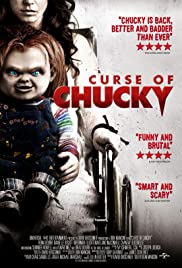
CURSE OF CHUCKY
US, 2013, 97 minutes, Colour.
Fiona Dourif, Danielle Bisutti, Brennan Elliott, Maitland Mc Connell, Summer H.Howell, A Martinez, Brad Dourif.
Directed by Don Mancini.
In 1988, audiences responded well to a horror film about a malevolent doll, Chucky. He was created by writer Don Mancini who spent over 30 years writing many films, short films, a television series about his doll, Chucky. He wrote and directed this particular version. It came out 25 years after the original.
The focus is on Nica, a young woman in a wheelchair, who lives in a rather large Gothic house. She is sent Chucky doll but does not know where it came from. Her sister comes with her husband and daughter, trying to persuade her to sell the house and move into care. They are accompanied by a priest.
There is a meal, Chucky poisons the meal of the priest and he dies in a car crash. The rest of the evening, a very stormy evening, Chucky continues to befriend the little girl but attacks the au pair that the couple have brought, then the mother, then the father, and then Nica.
Chucky is completely malevolent – and voiced, as ever, by Brad Dourif. Interestingly, Nica is played by Brad Dourif’s daughter, Fiona.
Just as the film’s ending there are flashbacks, a kind of origin story, explaining who the criminal is who inhabits the doll and why.
1. The long popularity of the Chucky stories? The work of Don Mancini, creating the characters, writing the screenplays for film and television? Directing this version?
2. Audience knowledge of Chucky, the doll, appearance, expressions, speaking? Smiling? Sinister? The various stories, origins, insinuation into families, murders?
3. The action taking place within the house, the touch of the Gothic, the staircases, elevator? The musical score?
4. Nica, her presence in the house, disabled? Yet her managing? Vivacity? The arrival of the group? Her relationship with Barb, the later flashbacks to their childhood, their mother pregnant with Nica, the consequences? Her staying in the house? Barb and her suggestion that it be sold and that Nica move into care? The discussions, Nica unwilling?
5. Barb, the touch of the sinister, her relationship with her husband, with Alice? With the au pair? The touch of arrogance, the later revelation of the relationship, in the kitchen, with the computer and the video link? The presence of the au pair, looking after Alice? At the meal, in the long search around the house for Chucky? The husband, amiable, asleep at the television, suspicious of his wife? Inserting the camera into Chucky? Alice, her age, curiosity, stories, the attraction towards Chucky?
6. The arrival of the parcel, the Chucky doll, the mystery, Nica and her finding, the discovery that he came from the evidence suppository? The video, the past, photo albums, her googling and discovery?
7. The presence of the priest, his supporting Barb, giving his opinions, staying for the meal, grace, Chucky poisoning him, the car crash?
8. Chucky, appearance, clothes, hair, speaking, the voice? Able to move from place to place? The sinister remarks, about God, death? Meaning of life? The bond with Alice? His poisoning the meal? The buildup to the various confrontations, the au pair’s searching for him, the computer, the water, her being electrocuted? The confrontation with Barb, her death? The husband, the camera, the eventual confrontation, the axe, his death?
9. Alice, the storm, being afraid, hiding? Chucky hiding her, continuing the relationship with her?
10. Nica, cooking the meal, hosting, the discussions, the mystery about Chucky? Her care for Alice? The elevator, stopping? Nica and her concern, climbing up the stairs backwards, Chucky throwing her over the landing?
11. The unexpected development of this plot, the flashbacks, the mystery man in the photo, criminal, the death of the father, the attack on the mother, tying her up? The fire, the criminal inhabiting the doll?
12. The mystery, Nica being blamed, the court case, her being sent to an institution?
Published in Movie Reviews
Published in
Movie Reviews
Saturday, 09 October 2021 13:02
Freaks... You're one of us
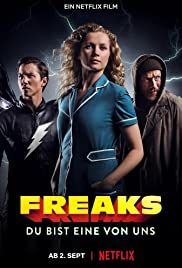
FREAKS: YOU'RE ONE OF US
Germany, 2020, 92 minutes, Colour.
Cornelia Groschel, Tim Oliver Shultz, Wotan Wilke Mohring, Nina Kunzedorf, Frederic Linkemann, Finnlay Berger.
Directed by Felix Binder.
The title sounds like something from a comic strip and, there are quite some references to comicstrips. This is a German film, but it could have been a story from anywhere.
The film opens with a desk thrown through a cement/ brick wall and a little girl sitting inside the apartment, fearful, and a doctor coming to treat her. This is Wendy. The film then cuts to the present day, Wendy married, a devoted husband, a young son, a comfortable home although there is a threat that they will be evicted. The husband is a security guard. Wendy has been working for some years at a diner linked with a service station.
So far, so ordinary. We see that Wendy is on medication and that she has interviews with the doctor from her childhood. She is rather meek in her work at the diner, wanting a raise but dominated by her bossy boss. There is a reticent young man also working there, Elmar. On the way home Wendy is taunted by drunken men, the young son is bullied by the local kids, Wendy is rather meek and retiring. However, she does encounter a vagrant looking for chicken scraps in the rubbish – he tells her that she is “one of us�, a select group of people with superior powers. He demonstrates this rather dramatically and, ultimately, Wendy flushes the tablets down the sink and begins to assert herself.
She discovers that she does have superpowers, extraordinary strength.
The basic idea of this story is very similar to the tales of the X-Men?, only much lower key and taking place in the suburbs. In fact, the film is like a pop-allegory about discovering one’s inner self, one’s inner strengths, acknowledging putdowns, authorities trying to control rather than to understand and encourage.
Which means that we see Wendy in action, powerful assertion towards the drunken men, the bully kids, the boss.
Just as there was Magneto in the X-Men? stories, here we have the transformation of Elmer, nerdish, no ambition, listening to Wendy, discovering his power, electric power. However, he has disappointed his ambitious father, is an avid reader of comics, buys his own superpower costume, but turns to evil.
While there are stunts and special effects, they are comparatively quiet compared with those in the familiar blockbusters. But, the moral is the same. And there is a teaser at the end of all the credits which should not be missed!
1. The title? The focus on the freaks, superpowers, specially chosen, unknown, medically suppressed? Discovering community?
2. The German setting, suburbia, homes, diners, the streets, ordinary suburban situations? The musical score?
3. Variation on an X-Men? scenario? More modest? Pop-analogy for society, the gifted, to 3 being suppressed and unwelcome? Finding bonding? To be heroes? To better the world? Yet also villains?
4. The prologue Wendy and the hole in the wall? The later flashback showing it? Her mother and concern? Dr Stern? Taking charge of Wendy?
5. Wendy, adult, married, her son, family life, the lifestyle, her husband in security? Her son bullied? Her working at the diner? Her boss and domination? Elmar and his work? Wendy looked down on, the leering men calling after her, the boys bullying her son, the driver parked in the disabled zone? Problems at home, evictions, money, her trying to get a raise, the boss’s hostility?
6. The encounter with Marek, vagrant, begging for food scraps, being turned away by the boss? Walking with Wendy? The strange conversation? The powers? His falling off the bridge, run over, yet revived? His explanations to Wendy, his accommodation in the vast arena?
7. The special people, Wendy taking tablets, Dr Stern increasing them, their being subjugated? Her asserting herself, bending the tray, lifting the boss, fighting the obnoxious men, smashing the bicycles of the boys? Shifting the car? Her trying to understand herself?
8. Elmar, nerd, working at the diner, no ambitions, his strong father objecting, his girlfriend and her presence? Elmar and Wendy, talking of the superpowers, Elmar discovering his electric powers, his name? His suit? Turning up? Advances on Wendy and her repelling him? His sad story about his father hugging him, the embrace and his crushing him?
9. Difficulties at home, Wendy and her husband, the boy knowing his mother’s powers? Her getting the money from the bank? The pool filling with water? The party with the children? Elmar and his turning up, evicted?
10. Wendy, a sense of responsibility, working with Marek? The challenge for the Freaks?
11. The buildup to a climax, Elmar and his electric powers, destructive? Wendy, the bonding with her husband, with her son? Marek, the police, his being shot? The presence of Dr Stern and her words to subdue the group? Elmar and his death?
12. The future – and the post-credits sequence of Wendy’s son and his superpower of elevating his opponents?
Published in Movie Reviews
Published in
Movie Reviews
Saturday, 09 October 2021 13:02
Love Guaranteed
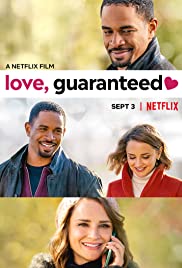
LOVE GUARANTEED
US, 2020, 90 minutes, Colour.
Rachel Leigh Cook, Damon Wayans Jr, Heather Graham, Caitlin Howden, Brendan Taylor, Sebastien Billingsly-Rodriguez?, Sean Amsing, Denise Durupt, Alvin Sanders, Jed Rees, Kandyce Mc Clure.
Directed by Mark Steven Johnson.
So, “they don’t make them like they did anymore�. Well, Love Guaranteed certainly puts paid to this objection. This is a love story, old-style in a modern setting.
While the title assures us that there is going to be a happy ending, Love Guaranteed actually is the name of a huge dating company, massive modern building, lush interiors… And, it is managed by a self-made glamorous CEO, Tamara Taylor, a comic touch performance by the glamorous Heather Graham dressed accordingly, quoting Buddha – not always accurately. And when a lawsuit comes up, she has a large table full of legal representatives.
And a case does come up.
Going back a little, the audience is introduced to Susan (Rachel Leigh Cook) rehearsing a speech (appealing to the jury to let Justice take off the blindfold and really see!) And then delivering it in court. She is a modern professional woman, focusing on building up her company, no time for any personal life except caring for her sister and her family who live next door.
On the way to work, she impedes a reticent gentleman, Nick (Damon Wayans Jr) at a takeaway trolley but then learns that he is her client. Nick must be one of the most charming leading men of any romantic comedy (and the quietest of any of the performances by the many Wayans family of whom Damon is a member).
And his case? Against Love Guaranteed. He has been on almost 1000 dates and has not found love at all! He offers a big cheque so Susan, along with her two comic assistants she works within the office, feel they must investigate. Nick who has been on all these dates – and eventually gets to 1000. Susan interviews a number of them and they will have only nice things to say about Nick. She and Nick venture to Love Guaranteed who want to do an out-of-court deal. No deal.
Of course, as Susan investigates and meets with Nick, love will be guaranteed. There are nice sequences with Susan’s sister, rushing to hospital to give birth. As Susan investigates Nick, she finds he works for the elderly at an Institute for rehabilitation, again charm personified. She meets Nick’s former fiancee – who also speaks well of Nick.
But, Love Guaranteed’s lawyers plan to prove that Nick found love, not on his dates, but because he was involved with the company in the case against them, in love with Susan!
Court scene, everybody speaking well of Nick, Nick behaving like a gentleman – and a happy (profitable) happy ending for all concerned.
Maybe too nice for many contemporary hard-edged tastes.
1. An old-style romantic comedy? A feelgood film?
2. The title? The irony of the title of the dating organisation? And the guarantee that love would be found on a date?
3. The introduction to Susan, lawyer, rehearsing in the toilet, the affirmation of the court guard? Her defence? Helping Jerome? His promising to help her?
4. Susan, her age, busy, her company, with her two assistants – and their comic performance? But always helpful? Weary, at home, her sister next door, dizziness the landlord, kindliness, their son? Susan and her hopes and prospects for her company?
5. At the takeaway, awkward, Nick behind her, walking with her, her being disturbed, his turning out to be her client? Nick, personality, charm, gradually revealed, his friendship with Jerome, at the centre, rehabilitation?
6. The case, the humorous touch, questioning the guarantee of the company, is almost 1000 dates, his description of the dates, the comic touches, the subtitle describing each, and Susan later interviewing them, their descriptions of the date, favourable to Nick, even the parents of the date?
7. Susan hesitant, the large check, her working on the handling of the case? The interviews with Nick, doing back check, meeting Jerome? The outings, the touch of love?
8. The visit to the company, the building, affluent, the table full of lawyers, Tamara Taylor and her quotes, wooded…? Susan correcting her about Heraclitus? Jones, spokesman? The deal? Negotiations? Susan refusing? Jones and his later tactic that Nick had fallen in love with Susan not because of the dates but because of the work with love Guaranteed – and the guarantee fulfilled?
9. Susan, with her sister, pregnant, Gideon, awkward, getting her to the hospital, the birth? Nick and Susan babysitting?
10. Susan, the visits to the various women, her being reassured? Her visit to Ariana? Nick and his version of what had happened, the breaking off of the engagement?
11. In court, Jerome, the assistance, everybody in court? The cross examinations? The women all speaking in Nick’s favour? Susan’s decision to call Ariana, the objection of the defence, the judge supporting her? Ariana, completely in favour of Nick?
12. Nick, on the stand, his being upset by Susan’s tactics, her knowing what Bill Jones was intending about the relationship?
13. Tamara Taylor, offering them a deal, their being the ideal photo couple for the firm?
14. Susan and Nick, the reconciliation? And the future?
Published in Movie Reviews
Published in
Movie Reviews